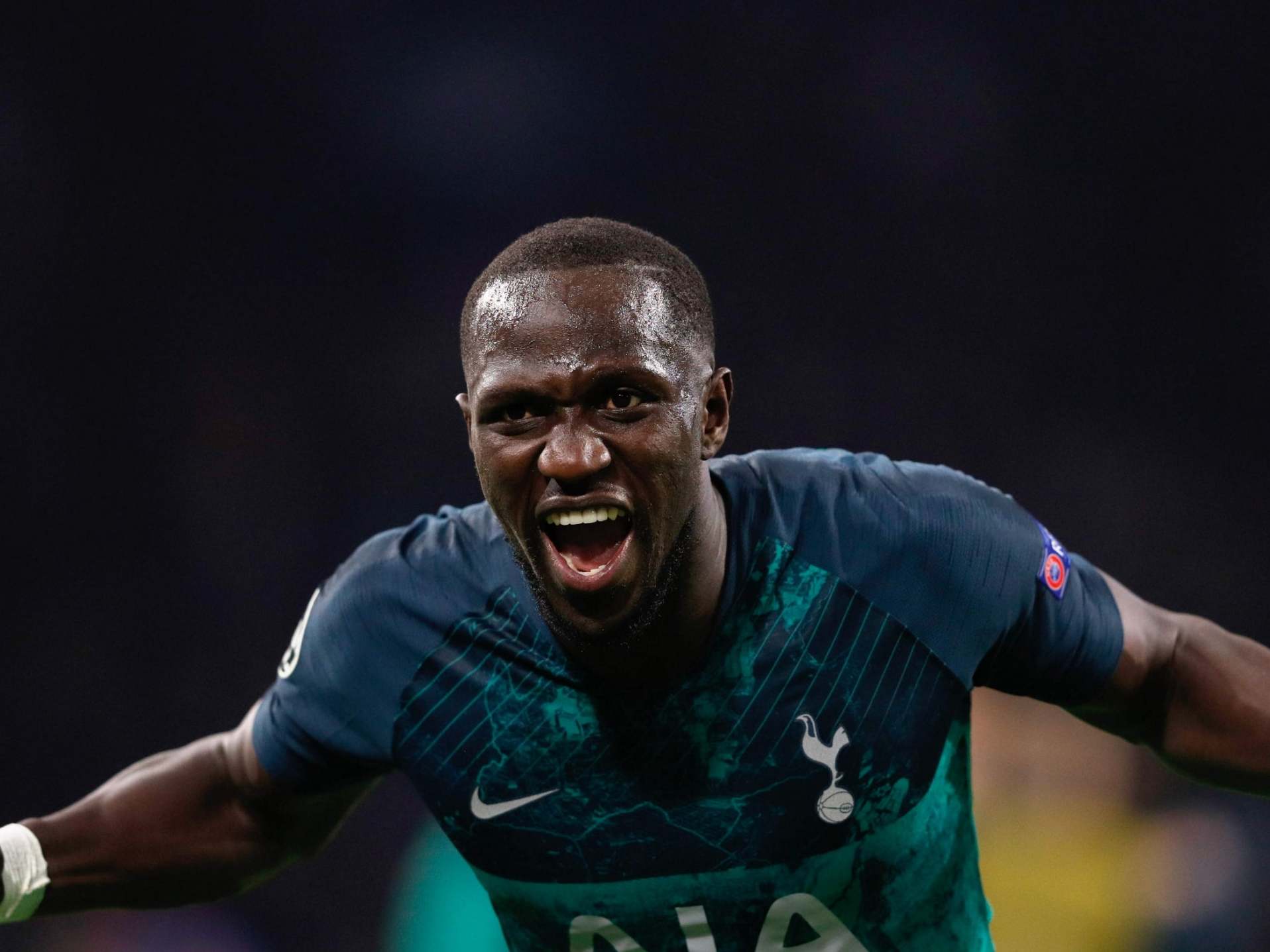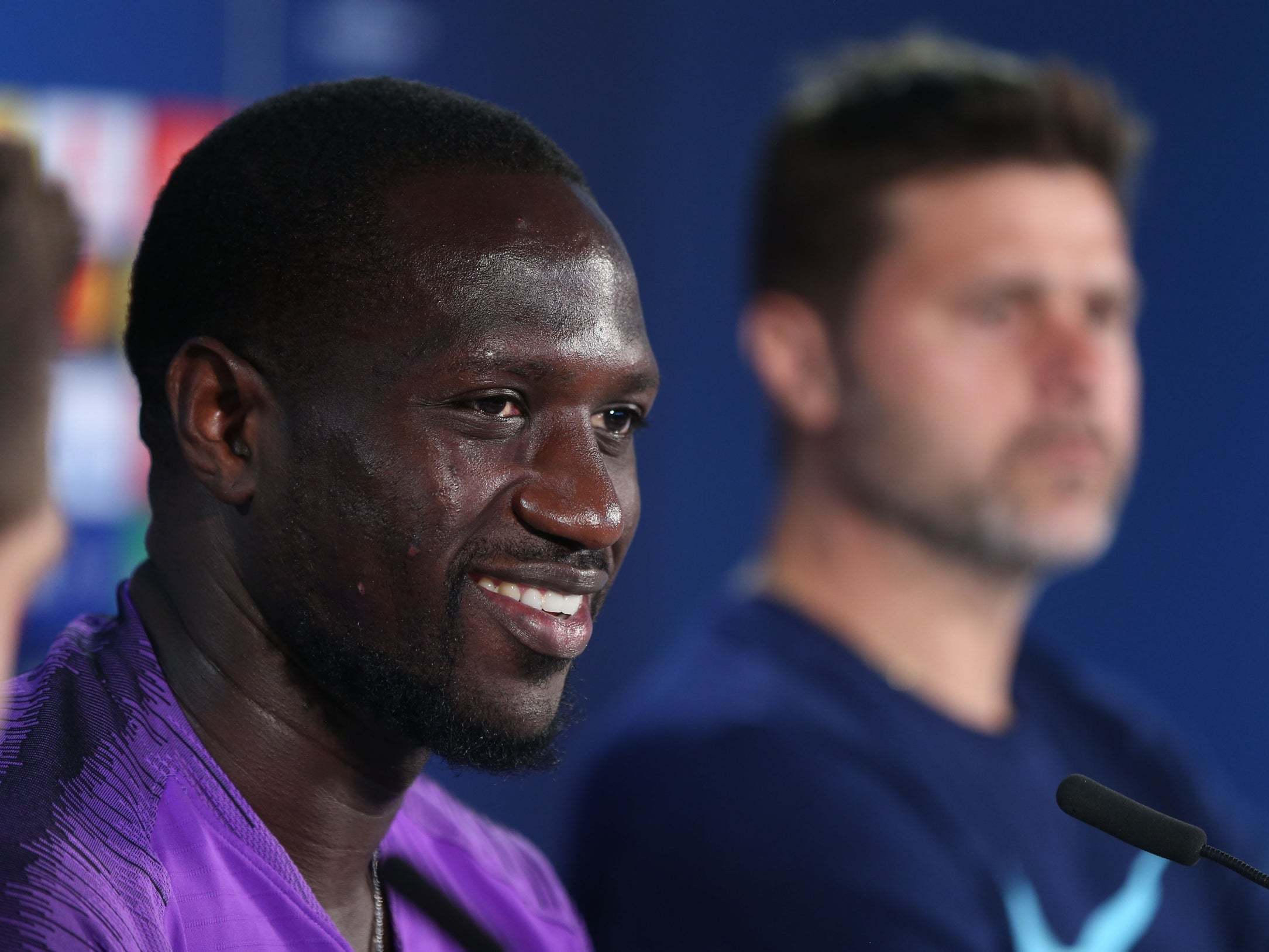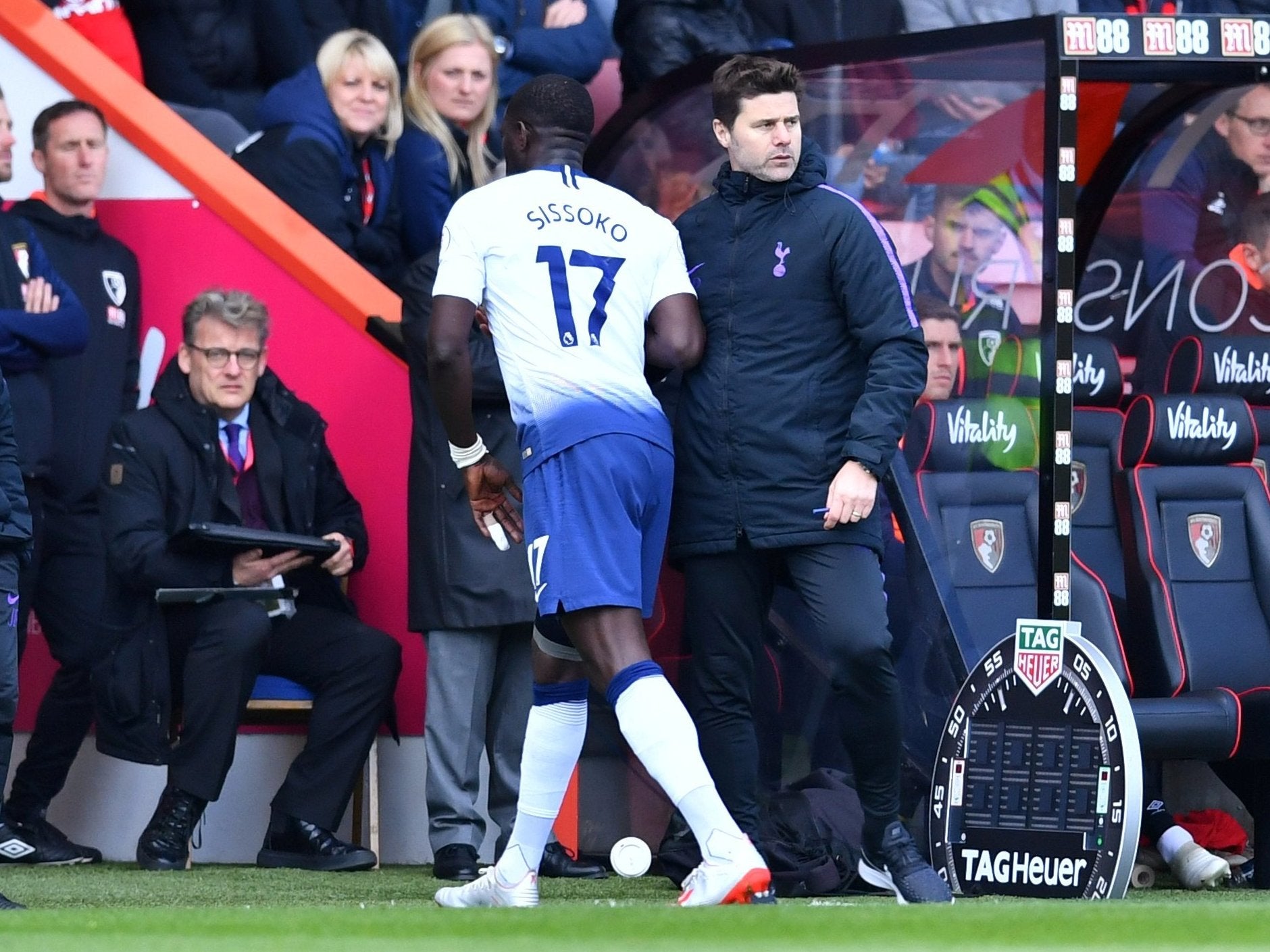Tottenham vs Liverpool: How Moussa Sissoko went from Spurs passenger to Champions League final driving force
The French midfielder has played a pivotal role for Mauricio Pochettino’s side on their unlikely run to Madrid

Your support helps us to tell the story
From reproductive rights to climate change to Big Tech, The Independent is on the ground when the story is developing. Whether it's investigating the financials of Elon Musk's pro-Trump PAC or producing our latest documentary, 'The A Word', which shines a light on the American women fighting for reproductive rights, we know how important it is to parse out the facts from the messaging.
At such a critical moment in US history, we need reporters on the ground. Your donation allows us to keep sending journalists to speak to both sides of the story.
The Independent is trusted by Americans across the entire political spectrum. And unlike many other quality news outlets, we choose not to lock Americans out of our reporting and analysis with paywalls. We believe quality journalism should be available to everyone, paid for by those who can afford it.
Your support makes all the difference.How did Moussa Sissoko get to the Champions League final?
Well, how does anyone?
By being one of the most influential midfielders in this year’s competition. By intervening at the decisive moments and bending them his way. By getting the better of his opponents; Barcelona, Borussia Dortmund, Manchester City, Ajax and the rest.
No player has been more reliable or more consistent this year, or more important to Spurs’ miracle run than Sissoko. And no-one has encapsulated its thrilling feeling – the spirit, the hunger, the sheer giddy unlikeliness of it all – than the man they spent at least two years wondering if they still had the receipt for.
This is the most surprising comeback story of the season. No player in recent years has transformed himself quite like Sissoko, from sub to star, from unsellable to undroppable, from passenger to driving force.
Because until really very recently, Sissoko had felt like a by-word for Spurs’ limitations. For their struggles in the transfer market, as a £30m record signing that no-one else wanted. For their lack of depth, as a downgrade from Mousa Dembele and Christian Eriksen. For the fundamental difference between Spurs and the richest sides. They get to pick the best players they can find, Spurs just have to make do. But Sissoko will be there in Madrid on Saturday, carrying his team’s hopes on his broad shoulders.
So, how did Moussa Sissoko finally get so good?
**
As Tottenham celebrated their comic-book win in Amsterdam three weeks ago, a memory was triggered inside Sissoko. This was his “best feeling” in football, but all the hysteria and disbelief in the Johan Cruyff Arena reminded Sissoko of the last time that he felt on top of the world.
“When you win that game, you know you are in the final of the Champions League, it is something amazing for a player,” Sissoko says in our interview at Spurs’ training ground last week. “But I can say, maybe this similar emotion in Euro 2016 with France. We beat Germany [in the semi-final] and they were in that time the best team in the world. We beat them, we go through to the final, it was a similar emotion.”
That was 7 July 2016, as two Antoine Griezmann goals gave France a 2-0 win over Germany in Marseille. Sissoko had been a key man in Didier Deschamps’ team, giving them energy down the right, showing more consistent application than he had managed in his three and a half seasons at Newcastle United. It felt as if Sissoko might finally fulfill the promise he showed at Toulouse. Three days later Sissoko was France’s best player in the final but France could not score and they had their hearts broken in extra time by Portugal’s Eder. “When you play a final, you don’t need to play [well],” he looks back now. “You need to win.”
And after that summer, Sissoko’s career did not go as well as he hoped. Yes, he got a dream move to Tottenham at the end of the window, Daniel Levy thinking he was a £30m punt worth taking. But arriving late, without a pre-season, meant that Sissoko was always playing catch up. This was Pochettino’s third season and by now he had his team working with the smooth unity of an orchestra. Throwing Sissoko in was like trying to fit in a drummer from a metal band.
Sissoko’s first meaningful contribution was to elbow Harry Arter in the face and get banned for three games. After that suspension Pochettino decided for two league games in November 2016 to not even pick Sissoko in his 18-man squad. In Brave New World, Pochettino put it down to badly-received comments about playing at Wembley, “combined with mistakes in his game, a lack of concentration and struggling to adapt to demands at Tottenham.” Pochettino even hammered Sissoko in public, saying he needed to work harder just to deserve to make the bench.

Tottenham finished 2016-17 with 26 wins and 86 points, their best league performance since Bill Nicholson, and a number they have not come close to since. Sissoko only made eight league starts, most of them on the wing. He was no more important to their success than Kevin Wimmer or Michel Vorm.
After spending years as the best player on his team, this was hard to take. So did he lose confidence? “No... but I wouldn’t say my confidence was high. At Newcastle and Toulouse I was playing every game. But I came to a new team, I was not playing, most of the time on the bench and coming on for 10 or 15 minutes. It was difficult. I had to stay strong in my head, even if it’s hard. My confidence wasn’t high but it wasn’t [all the way] down.”
Last season was not much better. Sissoko only started 15 league games. And after starting the first five World Cup qualifiers, he then lost his place in the France team, eventually not even making Didier Deschamps’ squad for Russia. Watching the team he used to be such an important part of lift the cup without him was hard to take. They could all atone for the agony of Paris. He could not.
“Of course I was disappointed. Before that I was part of all the selections [squads]. To not be involved in the World Cup, this is something very big for a player. Of course you would be disappointed.”
Later that summer Sissoko was put up for sale by Spurs, but they could not find a buyer.
**
Go back through the decisive moments of this Champions League campaign, the long string of unlikely events that has ended up with Tottenham in Madrid, and Sissoko was always there.
In Barcelona he was Spurs’ best player, driving them on to their second half comeback.
In Dortmund he killed off the tie, playing that crisp cutting pass through to Harry Kane for the game-over away goal.
Against City he set the first leg tempo, forcing them back, helping Spurs to that crucial 1-0 win.
And against Ajax his early introduction turned the flow of the first leg, as Spurs finally found a way to disrupt the game. Hakim Ziyech bemoaned the midfield influence of the “giant” Sissoko afterwards.
Or you can look into the Premier League season, when Sissoko started 27 games, more than he did in his first two campaigns put together. Like how he shut down Chelsea in the thrilling 3-1 win at Wembley. Or his artful assist for Erik Lamela at the London Stadium in October.
But ultimately for Sissoko it is not just about moments or peaks. There is plenty of false modesty in football but Sissoko is genuine when he declines to choose a best performance this season. He answers with a nervous laugh and a request to ask Pochettino instead.
“This answer, you should maybe ask the manager, maybe he will answer to you,” he says. “When I play a game, even if it is Chelsea or Ajax, or Burnley or Watford, I try to give my best and I try to be better and better. Each game of course is totally different. I don’t say to myself I have to be better in this game than a better one. I try to be consistent, and even improve. That’s why I can not tell you which is my best game this season.”
That consistency and reliability is what Sissoko was always accused of being incapable of when he was at Newcastle. But he has answered that now. One former senior Spurs official said that he was “speechless” at how good Sissoko was this season. Heung Min Son won the players’ and fans’ awards for this season but on Tuesday afternoon at the training ground Sissoko was presented with the Spurs legends’ awards by Graham Roberts. “When he goes on those runs, people just back off him,” Roberts said. “Like they’re frightened of him.”
That is exactly what Spurs had been missing. As Dembele and Wanyama got old, they lacked any force in the middle of the pitch. But Sissoko has given them some of their old dynamism back, breaking forward, running beyond the ball, or taking a hammer to the opposition’s attacks.

“I’m a player who likes to do box-to-box,” Sissoko explains. “I think I can help the team in both transitions: when we defend, and they [the opposition] are going on the counter-attack because I am strong and I am fast, I can recover the ball, I can help our full-backs when they are higher. At the same time when we go on counter-attack to score, I can make some runs behind the defence.”
Sissoko’s idol is a man who did great things on the other side of north London. “Tottenham fans won’t be happy, but my hero was Patrick Vieira,” he says. “He was playing for Arsenal but he was my idol. We have a similar style: he liked to do box-to-box, I’m tall like him, he was strong, ran a lot. So I think we’re similar. Maybe he was better than me, but I try to be close to him.”
Sissoko says that he “feels more power in the changing room” now, because he has started to justify his place in the team. “When you perform, your teammates demand more from you, I like that,” he says. “That why I try to be a leader on the pitch, fighting for every ball, running, doing a lot of things.”
**
So what happened? What was the science behind this football alchemy? What did Sissoko have to give up, or take up, to turn from a bad player into a good one?
But speak to Sissoko about how this has happened and there is no simple turning point or neat explanation. “No, honestly, I think it was step-by-step,” he says. When asked for anything different he has done to transform himself, Sissoko gives the standard answers of any professional footballer. He mentions “extra things to improve”, says they are “private” and does not want to expand beyond the basics: “How you eat, rest, sleep and recover, and more focus on training.”
Sometimes there is no easy external solution. This time the switch and the strength was in Sissoko’s head. His mentality was how he ignored the criticism, coped with the rejection, survived that upsetting summer without ever feeling sorry for himself or ever giving up. Because it would have been easy to stop trying last year, to give up on Spurs, give up on France, to accept that at 29 years old he was probably never going to fulfill his natural talents. Because after all, World Cups aren’t for everyone, the Champions Leagues isn’t for everyone, and if he couldn’t quite cut it at the top then he could always go back to France.
But Sissoko did not see it like that last summer. “I said to myself: I need to stay focused on myself and keep working. Because if you give up, the things will go down and down. I need to stay calm and keep working. And try to change everything.”

It shows that there is such a thing as trying too hard. Sissoko’s great triumph has been to avoid that. And to allow his confidence to grow with every game. “I try to be relaxed in my head. Try to be better at the training. And if I had the opportunity to play, try to play well. And then that’s what I’ve done. And after, when I have played well, to try to do the same in the next game. And to keep going. Like I said, step by step.”
This is why there is no click moment, no magic factor external to Sissoko. He played more, he believed more, he played better, a virtuous circle that is still turning even now. “It’s the confidence,” he says. “I had the opportunity to play in the beginning of the season and I did well, so I kept playing. When you play a few games in a row, you have more confidence in yourself, you try to do more things. That’s why I feel more confident with the team right now.”
The solution was inside Sissoko all along. So while the whole football world is shocked by his transformation, he is not. He always knew he had it in him. He just needed to get it out. “Surprised? No. First of all, because I always believe in myself. I knew to come here, with this manager, I would improve. I am not surprised with what I am doing. In football, most things are about confidence. If you have a lot of confidence in your head, you can do a lot of things.”
Join our commenting forum
Join thought-provoking conversations, follow other Independent readers and see their replies
Comments